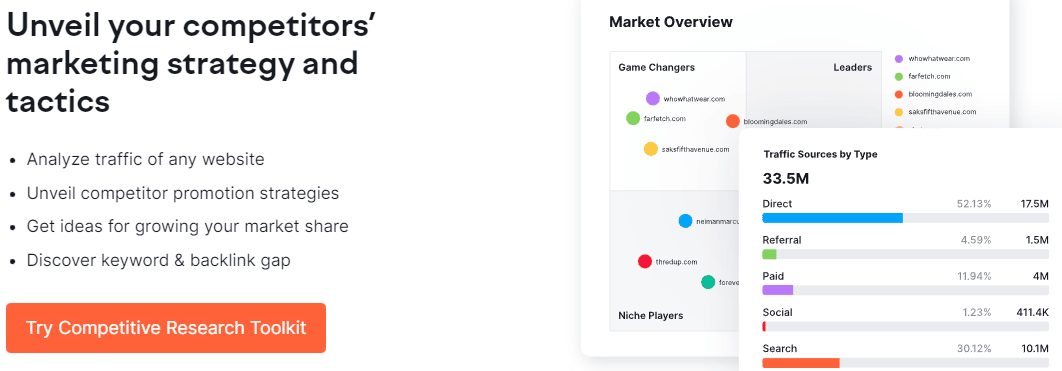Build Discovery and Relevance for Search Engines
The most crucial factor to consider when building discovery and relevance for search engines is optimizing content through SEO. SEO stands for Search Engine Optimization, which is vital to ensuring that potential customers or users can find your website.
This includes optimizing titles and meta descriptions, utilizing relevant keywords, ensuring up-to-date content, and using proper site structure. Additionally, backlinks from other websites to your website can help build credibility and relevancy with search engine algorithms, as well as engaging content that encourages users to stay on the page longer.

Search engine optimization for your web page
Search engines consider all these factors when determining how highly ranked a webpage will be in the search results. Therefore, when building discovery and relevance for search engines, SEO is an essential part of the process.
Building upon user experience to promote discovery and relevance is also important. This includes creating a website that is easily navigable and user-friendly, as well as providing relevant and engaging content.
By incorporating these elements into the website design, you can encourage returns from users who are likely to find value in your products or services. You can read how algorithms and rankings work on Google here.
SEO and user experience are essential for building discovery and relevance for search engines. Optimizing content and website design are necessary to build credibility with search engine algorithms and improve the overall user experience.
By utilizing SEO tactics and creating an engaging website, you can build discovery and relevance for search engines to increase the visibility of your website.
Understanding SEO and its importance
Understanding SEO and its importance is essential for any business or organization looking to build relevance and discovery for their website. SEO stands for “Search Engine Optimization,” which refers to optimizing a website to rank higher in search engine results pages (SERPs).

SEO works by increasing the visibility of websites on search engines, helping businesses build discovery and relevance for their sites.
Identifying keywords to build relevance is an integral part of SEO. Keywords are specific words or phrases people use when searching for something on a search engine. By finding the right keywords relevant to your business or organization, you can create content with those keywords and make it easier for search engines to find your site.
Read on the importance of backlinks and SEO strategies here.
Optimizing content with relevant keywords is essential to build relevance and visibility on the web. Using keywords that accurately reflect your business or organization to create relevance for those specific topics is critical. This will help search engines identify and index your website more efficiently, building discovery and increasing visibility.
Utilizing link-building strategies to build discovery is also a great way to improve your SEO efforts. Link building involves creating links from other websites to your own to make authority and relevance for search engines. This will help build trust with search engines and create more pathways for potential customers to find your website.
Creating a sitemap for better search engine visibility is another essential SEO tactic. A sitemap is an XML document containing all your website's URLs, making it easier for search engines to crawl and index your site. This will help build discovery and relevance by improving your visibility on the web.
Identifying keywords to build relevance
Identifying keywords to build relevance is an essential part of optimizing for search engines. The goal is to choose keywords that accurately represent the content and are used by potential customers when searching online. To build relevance, it's essential to use a combination of short and long-tail keywords and relevant synonyms and related words.
Optimizing content with relevant keywords is the next step in creating relevance for search engines. This means naturally including keywords in headlines, subheadings, and throughout the body of content. However, it's also essential to ensure that keyword density does not become too high, as this can harm SEO.
Link-building strategies are essential for creating discovery. This involves connecting content with other relevant websites and related pages on the same website. In addition, link building helps build trust and authority, which search engines use to determine relevance.
Creating a sitemap is an essential part of optimizing for search engine visibility. A sitemap is essentially a list of all the pages on a website and helps search engines quickly identify the content available. It also provides context for all the different content types being indexed.
Finally, tracking progress through analytics is an essential step in understanding the effectiveness of SEO efforts. This can be done by looking at organic traffic sources, keyword rankings, conversions, and other metrics.
Analytics can provide valuable insights into how well SEO strategies are working and allow for adjustments to be made to optimize results.
By understanding the importance of SEO and utilizing a combination of relevant keywords, link-building strategies, content optimization, and analytics tracking, businesses can build discovery and relevance for search engines. This will help them reach more potential customers and build a successful online presence.
The above steps can help businesses build discovery and relevance for search engines, allowing them to reach more potential customers and build a successful online presence.
By leveraging SEO strategies and utilizing a combination of relevant keywords, link building, content optimization, and analytics tracking, businesses can build discovery and relevance for search engines.
This will help them reach more potential customers, build trust and authority with search engines, and build a successful online presence. With a clear understanding of SEO and its importance, businesses will be well-positioned to build discovery and relevance for search engines.
Building discovery and relevance for search engines are essential to digital marketing success. Understanding SEO, leveraging relevant keywords, optimizing content, utilizing link-building strategies, and tracking progress through analytics are all critical steps in building relevance for search engines.
Doing so will help businesses build trust and authority with search engines, reach more potential customers and build a successful online presence.
Optimizing content with relevant keywords
Optimizing content with relevant keywords is crucial to building relevance for search engines. This involves finding the most important and relevant words for a particular topic or subject, then strategically placing them throughout the content to increase its chances of being discovered.
To identify the best keywords to use, it's crucial to understand the topic and the search engine's algorithms comprehensively. In addition, link-building strategies such as guest blogging and backlinks from relevant sites are also vital for building discovery, as it helps build up content visibility on a particular website or page.
Creating a sitemap can be very beneficial in helping search engines better navigate and index a website. It also helps build relevance by giving search engines an organized view of the website's content and structure to identify important pages quickly.
Finally, tracking progress through analytics is key for any SEO strategy. This allows you to measure the success of your efforts in terms of visibility and traffic from search results. Google Analytics, for example, is an excellent tool for this purpose. However, if you're looking for something much better, try SemRush.
By following these steps, you can build discovery and relevance for search engines and increase your chances of SEO success. It's important to note that SEO is an ongoing process as algorithms are constantly changing, so it's essential to stay up-to-date and be aware of the latest guidelines.
With careful planning and execution, though, you can build a successful SEO strategy. Read our post on the best SEO optimizer for your content here.
Utilizing link-building strategies to build discovery
Building discovery and relevance for search engines is key to improving visibility online. Link-building strategies can be an effective way of achieving this goal. Link building involves creating links from other websites that direct users to your website or content.
This helps build authority and relevance, as well as build brand credibility in the eyes of search engine algorithms like Google. SEO tactics also play a crucial role in improving relevance and building discovery.
Search engine optimization (SEO) involves optimizing your website and content for the right keywords related to your business. Then, when users search queries that include those keywords, your content or website is more likely to appear on the search engine results page.

Additionally, creating social media accounts and consistently engaging with your audience can build more visibility and increase brand recognition, which in turn helps build discovery.
Finally, using the right tools to track and analyze how users interact with your content and website is invaluable for improving relevance for search engines. By doing this, you will be able to identify areas of improvement and develop strategies that drive more visibility and build discovery.
Creating a sitemap for better search engine visibility
Creating a sitemap is essential to building discovery and relevance for search engines. A sitemap is essentially a document that lists all your website pages for visitors and search engine crawlers to discover.
This document allows search engines to quickly find and index all the pages on your site, making it easier for them to rank your website accurately. Additionally, you can use SEO best practices to build relevance for search engines.
This includes using targeted keywords in your titles and Meta-descriptions, increasing the chances of appearing in relevant searches. You should also optimize images with alt tags and utilize structured data to provide additional context regarding web pages and content on your site.
Following these SEO best practices can help increase your website's rank in search engine results and build discovery for your site.

This is important because a well-optimized website can drive more traffic to your website and build a larger audience for your business or content.
Additionally, building discovery and relevance for search engines can help build trust with visitors as it demonstrates that you are providing quality content that is accurately indexed in the SERPs.
By building discovery and relevance for search engines, you can ensure that visitors can easily find your website through organic searches. This helps build trust with your visitors and drive more traffic to your website.
Furthermore, you should use SEO best practices such as targeted keywords, optimized images, and structured data to build relevance for search engines and increase the chances of appearing in SERPs. Doing this will build discovery for your site and ensure visitors can find your website quickly and accurately.
Should I choose HTML or XML sitemaps?
When creating a sitemap, it is important to know the difference between HTML and XML sitemaps. An HTML sitemap is a page on your website that links to all other pages or sections of your site.
This is meant for visitors to find different parts of your website more easily. An XML sitemap is a document specifically designed for search engine crawlers. This contains links to your web pages and additional information, such as when the page was last updated or how often it changes. XML sitemaps help search engines index and discover your content more accurately.
Building discovery and relevance for search engines are essential for any website looking to build an audience. Creating a sitemap is an important first step, allowing search engine crawlers to quickly and accurately index your web pages.
Additionally, using SEO best practices such as targeted keywords and structured data can help build relevance for search engines and increase your chances of appearing in SERPs. Finally, it is essential to understand the difference between HTML and XML sitemaps, as each one serves a specific purpose in helping build discovery and relevance for your website.
By utilizing these practices, you can build trust with visitors and ensure that more people can find your website through organic searches.
According to Google, an HTML sitemap should never be needed. So you can have both, but if you HAD to choose just ONE, go XML.
Tracking progress through analytics
Tracking progress through analytics is crucial to building discovery and relevance for search engines. Businesses can use data-driven insights to create an effective SEO strategy to measure their success and optimize their campaigns over time.
Analytics provide clear evidence to determine how relevant a website is to its target audience, what keywords perform well, and where the most valuable traffic comes from. In addition, analytics allow businesses to track the effectiveness of their SEO efforts and quickly identify areas where further improvements can be made.
With access to relevant, data-driven insights, businesses can easily measure the success of their campaigns and make necessary adjustments to ensure they are reaching their desired goals. By leveraging analytics to understand user behavior, companies can develop highly successful SEO strategies that drive more traffic, boosts rankings, and increase conversions.
With the right analytics, businesses can increase their search engine visibility and capture more business opportunities.
Google Search Console is a powerful tool for tracking progress with analytics. So whether you want to monitor as much traffic as possible or identify the high-quality content that works best on Google, Google Search Console has it all.
It provides data-driven insights so businesses can tailor their SEO strategy and adjust their approach accordingly, making Google Search Console an essential asset for any business looking to make the most of their web presence.
You can read our Ranktracker reviews and alternatives here.
Search Console also provides a wealth of information about where your content ranks in the SERPs, which keywords drive the most traffic to your website, and how many users click through from search results. You can even track the performance of individual pages or blog posts to see what type of content performs best for each keyword.
By utilizing the data available through Google Search Console, businesses can identify areas of opportunity and develop tailored SEO strategies to ensure their content reaches the right people.
Google also provides a range of tools to help you measure success and track progress effectively. For example, with its reporting capabilities, businesses can gain an in-depth understanding of how their SEO strategies are performing and take action quickly to improve their visibility in the SERPs.
This helps businesses stay one step ahead of their competitors, allowing them to make the most of their online presence.
Recommended reading:




